
PSYCHOLOGIE IN ERZIEHUNG UND UNTERRICHT
Scope & Guideline
Empowering educators through cutting-edge psychological practices.
Introduction
Aims and Scopes
- Psychological Factors in Education:
The journal emphasizes the role of psychological principles in shaping educational practices, including understanding student behavior, motivation, and emotional development. - Early Childhood Development and Intervention:
A significant focus is on early childhood education, including interventions for children aged 0-3 and the impact of external factors like the COVID-19 pandemic on child development. - Teacher Training and Professional Development:
Research on teacher training, including the development of competencies, self-efficacy, and mental health literacy, is prominently featured. - Family Dynamics and Support Systems:
The journal addresses the influence of family on children's educational experiences, exploring parenting stress, family roles, and support systems for children with special needs. - Digital Learning and Technology Integration:
There is a growing interest in the impact of digital tools and online learning environments on educational outcomes and teacher practices.
Trending and Emerging
- Impact of COVID-19 on Education:
A significant trend is the exploration of how the COVID-19 pandemic has affected educational practices, family dynamics, and child development, highlighting resilience and adaptation in times of crisis. - Mental Health and Well-Being in Education:
There is an increasing emphasis on mental health literacy among teachers and the psychological well-being of students, acknowledging the vital role of mental health in educational success. - Digital Learning Environments:
Research on digital learning, including the use of technology in classrooms and its effects on student engagement and motivation, is gaining prominence as education increasingly integrates digital tools. - Resilience and Protective Factors in Education:
Emerging studies focus on resilience, particularly in early childhood and among teachers, examining how protective factors can mitigate stress and enhance educational outcomes. - Inclusive Education Practices:
There is a growing interest in inclusive education, addressing diversity in classrooms and the need for tailored support for students with varying needs, fostering a more equitable educational environment.
Declining or Waning
- Traditional Classroom Management Techniques:
Research related to traditional classroom management strategies seems to be less prevalent, possibly overshadowed by a focus on more holistic approaches to education and student well-being. - Gender-Specific Educational Research:
While gender differences in education were previously a focal point, recent publications indicate a waning interest in this area, suggesting a shift towards more inclusive and diverse educational frameworks. - Assessment and Standardized Testing:
There appears to be a declining emphasis on standardized testing and traditional assessment methods, with more attention being directed towards formative assessments and personalized learning approaches. - Parent-Teacher Communication Strategies:
While still relevant, the specific exploration of parent-teacher communication strategies has become less frequent, perhaps due to a broader focus on overall family dynamics and support systems. - Research on Learning Disabilities:
Although important, the specific studies addressing learning disabilities and their assessment are appearing less frequently, possibly replaced by a more general approach to inclusivity and support for all learners.
Similar Journals

Education and Training in Autism and Developmental Disabilities
Fostering Inclusive Practices for Diverse LearnersEducation and Training in Autism and Developmental Disabilities is a prominent journal published by the Council for Exceptional Children, focusing on innovative research and insights in the field of autism and developmental disabilities education. With an evolving scope since its inception, the journal emphasizes the importance of evidence-based practices, pedagogical strategies, and interdisciplinary approaches to enhance educational outcomes for individuals with autism and related conditions. Although it currently holds a Q3 category in Developmental and Educational Psychology and is ranked in the Q2 category in Education, it continues to gain recognition with a respectable placement in Scopus rankings—indicating that it plays a crucial role in informing educational practices and policy decisions. Researchers and practitioners can access a wealth of information through its open access options, underscoring a commitment to disseminating knowledge widely. By bridging the gap between research and real-world application, this journal serves as an essential resource for education professionals seeking to advance their understanding and improve the quality of education for neurodiverse learners.
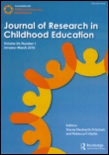
Journal of Research in Childhood Education
Transforming theories into actionable insights.The Journal of Research in Childhood Education, published by Routledge Journals, Taylor & Francis Ltd, is a prestigious academic journal that has been at the forefront of childhood education research since its inception in 1986. With an ISSN of 0256-8543 and E-ISSN 2150-2641, this journal serves an essential role in disseminating findings and discussions pertinent to the fields of developmental and educational psychology, as demonstrated by its notable rankings in the 2023 Scopus Ranks, placing it in the 66th percentile of Educational Social Sciences and 49th percentile in Developmental Psychology. With a current Q2 category quartile designation in both Developmental and Educational Psychology and Education, it aims to foster a deeper understanding of the complexities surrounding childhood education practices and policies. Researchers, educators, and students alike will find robust and insightful research that contributes to advancing educational theories and practices, supporting the journal's mission to enhance the overall quality of education for children globally. This journal continues to be a critical resource for individuals passionate about enhancing early childhood education and comprehending the developmental challenges faced by children today.
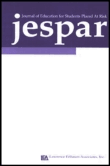
Journal of Education for Students Placed at Risk
Illuminating Pathways to Educational SuccessJournal of Education for Students Placed at Risk, published by Taylor & Francis Inc, stands at the forefront of educational research, particularly focused on the challenges and strategies related to at-risk student populations. This peer-reviewed journal, with the ISSN 1082-4669 and E-ISSN 1532-7671, serves as a conduit for innovative and impactful studies that aim to inform policy and practice in education. Acknowledged for its excellence, the journal holds a distinguished Q1 ranking in the Education category as of 2023, showcasing its relevance and influence in the field. Across its converged years from 2010 to 2024, it has consistently contributed valuable insights, evidenced by its Scopus rank of 438 out of 1543 in the Social Sciences and Education arena, placing it in the top 71st percentile. Researchers, professionals, and students alike will find an array of articles that address crucial issues faced by marginalized learners, making it an essential resource for advancing effective and equitable educational practices.
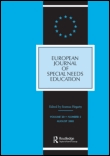
European Journal of Special Needs Education
Elevating special needs education through collaboration.European Journal of Special Needs Education is a prestigious publication dedicated to advancing knowledge and research in the field of special needs education. Published by Routledge Journals, Taylor & Francis Ltd, this journal serves as a vital platform for researchers, educators, and practitioners to share innovative ideas and findings that address the complexities of special education in diverse contexts. With an impressive standing in academic circles, it holds a Q1 ranking in both Education and Health Professions, alongside a Q2 ranking in Developmental and Educational Psychology, reflecting its broad impact and relevance. The journal has been in publication since 1986 and continues to attract a wide readership, supported by its rigorous peer-review process. While currently not an open-access journal, it provides a rich repository of scholarly articles aimed at enhancing education for individuals with special needs, ensuring that its contributions are both meaningful and accessible to those dedicated to improving educational outcomes. The European Journal of Special Needs Education embraces a multidisciplinary approach, fostering dialogue among professionals in education, psychology, and health, ultimately shaping policies and practices for a more inclusive society.
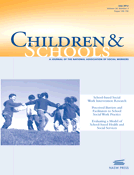
Children & Schools
Transforming challenges into opportunities for young learners.Children & Schools, published by Oxford University Press, serves as a vital academic journal that bridges the fields of education and social health, demonstrating its importance in addressing the multifaceted challenges facing children in educational settings. With an ISSN of 1532-8759, this journal is committed to disseminating high-quality research from 1978 to the present, marking its influential position as a Q2 ranked journal in both Education and Health (social science) categories as of 2023. The journal's engaging content reflects its dedication to advancing knowledge and practice within these critical areas, appealing to researchers, educators, social workers, and policymakers alike. It is especially noted for its accessibility through robust scholarly contributions, making it a pivotal resource for understanding the developmental and social needs of children in schools. As a member of the Scopus rankings, boasting a 70th percentile in Education and a 63rd percentile in Health (social science), Children & Schools remains essential for advancing research and best practices in nurturing the educational environment for children.

Educational and Developmental Psychologist
Shaping the future of educational psychology through rigorous research.The Educational and Developmental Psychologist is a premier journal dedicated to advancing research and practice in the fields of educational and developmental psychology, published by Taylor & Francis Ltd. With an ISSN of 2059-0776 and an E-ISSN of 2059-0784, this journal has established itself as a key resource for researchers and practitioners alike, providing a platform for innovative studies that bridge theory and application. With a 2023 Scopus ranking placing it in the top 73rd percentile in Education and 58th in Developmental Psychology, it highlights significant findings that are shaping educational practices globally. Operating from the United Kingdom, this journal is committed to disseminating high-quality, peer-reviewed research that is crucial for professionals addressing the challenges encountered in educational settings. Although it is not an open-access journal, its impact on educational psychology is noteworthy, reflecting rigorous standards in its publication process. The journal's scope encompasses a wide variety of topics, promoting an interdisciplinary dialogue that is essential for the advancement of knowledge in education.
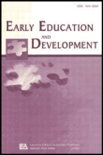
Early Education and Development
Connecting Theory to Practice in Early EducationEarly Education and Development is a prestigious journal published by Routledge Journals, Taylor & Francis Ltd, dedicated to advancing the field of early childhood education and developmental psychology. With an ISSN of 1040-9289 and an E-ISSN of 1556-6935, this journal has garnered an impressive reputation, achieving a Q1 ranking in both Developmental and Educational Psychology as well as Education as of 2023. Its influence is reflected in its Scopus rankings, standing at #236 out of 1,543 in Social Sciences (Education) and #83 out of 360 in Psychology (Developmental and Educational Psychology), positioning it in the 84th and 77th percentiles, respectively. Operative since 1989, Early Education and Development serves as a vital resource for researchers, educators, and policymakers by publishing cutting-edge research, theoretical frameworks, and practical applications that shape early educational practices globally. Though it does not currently offer open access options, its contributions remain essential for those looking to stay abreast of the latest developments and best practices in early education.

INTERNATIONAL JOURNAL OF EARLY CHILDHOOD
Advancing early childhood education through innovative research.INTERNATIONAL JOURNAL OF EARLY CHILDHOOD, published by Springer, is a prestigious platform dedicated to the exploration and advancement of knowledge in the fields of Developmental and Educational Psychology as well as Education. With an ISSN of 0020-7187 and E-ISSN 1878-4658, this journal plays a pivotal role in disseminating research findings and theoretical developments related to early childhood education worldwide. Its impact is underscored by its noteworthy rankings, placing it in the Q2 category for Developmental and Educational Psychology and Q1 in Education in 2023, reflecting its significance in the scholarly community. With a robust Scopus rank of #186 out of 1543 in Social Sciences Education and #68 of 360 in Developmental and Educational Psychology, this journal ensures high visibility and engagement for innovative research. Since its inception in 1969, the journal has served as a vital resource for researchers, educators, and policy-makers interested in shaping the future of education through empirical evidence and comprehensive studies.
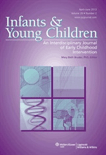
Infants & Young Children
Illuminating the Pathways of Infancy and ChildhoodInfants & Young Children is a pioneering journal established in 1988 and published by Lippincott Williams & Wilkins, focusing on the critical developmental phases of infancy and early childhood. With a commitment to advancing research in Developmental and Educational Psychology, Pediatrics, Perinatology and Child Health, as well as Psychiatry and Mental Health, this journal serves as an essential resource for professionals and scholars dedicated to understanding and enhancing the early years of life. As a member of the Q3 category in multiple relevant fields, it informs and stimulates discourse with its impactful scholarly articles, meeting the diverse needs of researchers, practitioners, and policymakers alike. Though access is not currently open, subscribers can expect high-quality, peer-reviewed research that underscores the importance of early experiences in shaping lifelong outcomes. Located in Philadelphia, this journal continues to make significant contributions to child health and education, aiming to bridge gaps in knowledge and ensure a foundation for thriving, healthy futures.

Australasian Journal of Early Childhood
Transforming Policies for a Brighter Future in Early Education.The Australasian Journal of Early Childhood, published by SAGE Publications Ltd, serves as a vital resource for researchers, practitioners, and educators dedicated to the field of early childhood education. With an ISSN of 1836-9391 and E-ISSN of 1839-5961, this journal provides peer-reviewed articles and studies aimed at improving educational practices and policies within the developmental and educational psychology sectors. As of 2023, it holds a respectable Q3 quartile ranking in Developmental and Educational Psychology and Q2 in Education, highlighting its critical engagement with current issues and research. Ranked within the top 67th percentile in Social Sciences - Education and the 50th percentile in Developmental Psychology according to Scopus metrics, the journal is recognized for its contribution to advancing knowledge and practice in early childhood settings. Located in Australia and operating under rigorous standards, the journal is particularly important for fostering a deeper understanding of early childhood development, promoting evidence-based practices, and advocating for policy improvements that benefit educators and learners alike.